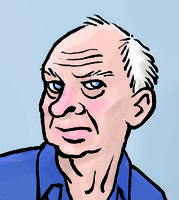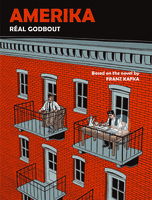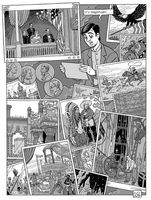Guttersnipes: Réal Godbout
By Evan Munday
TCAF is the Toronto Comic Arts Festival. It is an annual week-long celebration of comics and graphic novels and their creators, featuring readings, interviews, panels, workshops, gallery shows, art installations, and culminating in a two-day exhibition and vendor fair featuring hundreds of comics creators from around the world. The Toronto Comic Arts Festival 2014 will take place Saturday, May 10 and Sunday May 11, at Toronto Reference Library (789 Yonge Street). Admission is free. Leading up to the Festival, I'll be interviewing some of the dazzling comic writers and illustrators – particularly the Canadian ones – who have brand-new books out for TCAF.
Réal Godbout is a self-taught artist who began his career in the 1970s, becoming the artist and co-writer of the two series Michel Risque and Red Ketchup in the 1980s. He is often recognized as one of the integral Quebec comic creators of his generation and a leader of comics' rebirth during a period sometimes referred to as the 'Spring of the BDQ' working for magazines like Quartier Latin and BD. Godbout works primarily in illustration and animation storyboards. Since 1999, he has taught comic art in the fine arts program at the Université du Québec en Outaouais. His most famous creations, Michel Risque and Red Ketchup, are currently being collected and re-released by Éditions de la Pastèque. His latest BD book, L'Amérique ou Le Disparu, is being published in English by Conundrum Press as Amerika.
Please describe, as best you can, your new comic book as an equation of movies. (e.g. Passenger 57 + Fried Green Tomatoes – unintentional cannibalism)
Modern Times + After Hours = Feeling of displacement.
What was your favourite comic book when you were thirteen?
At that time, I was still pretty much into Tintin. It was also the beginning of my Pilote period. Pilote was a French weekly magazine, which featured, among other things, Astérix and Blueberry.
What was the name and general premise of the first comic book you ever made? (That is, when you were a kid, making comics for your siblings and/or friends?)
As a kid, I was drawing a lot, but I don't remember any serious attempt at comics. Later, in college (I was about 18), I did something called Capitaine Bois-de-Boulogne, a kind of student-rebel satirical stuff.
Have you been to TCAF before? If so, what’s your favourite TCAF memory? If not, what are you most looking forward to?
First time at TCAF. I'm here to launch my first English translated book. And to have fun, too, I hope.
Your CanLit News
Subscribe to Open Book’s newsletter to get local book events, literary content, writing tips, and more in your inbox
What do you find the most difficult thing to write? Draw?
Drawing definitely takes a lot more time and effort. But I feel much safer drawing than trying to make up a story out of nothing. Once I get an idea to start with, the writing process follows naturally. I have absolutely no system in writing a script. I just put down on paper whatever feels right (and fun to draw, as much as possible). What makes things easier for me is that I work most of the time with a co-writer, living (Pierre Fournier) or dead (Franz Kafka). That helps you feel confident with your story.
TCAF is now over ten years old. What’s the biggest change you've noticed in the world of comics in the past ten years?
Women.
What was the biggest challenge in translating or adapting Kafka's work to comics?
My first goal was to remain faithful to the story without being too literal. So, once the novel was well assimilated, I put it aside and wrote my own in a graphic way, giving it a dramatic structure that wasn't in the book, trying to make it visual first, then relying on dialogue and using narrative captions as little as possible. Another challenge was that the novel is unfinished, so I had to make up a few parts. But that wasn't so much of a problem to me.
Amerika is funnier and more vibrant than the stereotypical view of Kafka. Do you think Kafka's work is more joyful than it’s usually remembered as?
I wouldn't say joyful, because it's mostly pessimistic. But funny, definitely. Still, you have to spot the humour, which is not obvious, depending on the way you read it. You can find humour in most of Kafka's work anyway, although Amerika is lighter than the rest.
Kafka never visited America before writing this book. I imagine you have. What American moments or experiences of your did you try to bring to the creation of Amerika?
I'm a North American, too, even though Quebec is a lot different from the rest of the continent. I've been to the U.S. often, of course, and a few times to New York City. So, while Kafka's vision of America is very central European, mine is less exotic. But I tried to keep that slightly unreal flavour. And I wasn't there in 1913!
Visit torontocomics.com to find out more about TCAF and Réal Godbout's appearance at the festival.
The views expressed in the Writer-in-Residence blogs are those held by the authors and do not necessarily reflect the views of Open Book: Toronto.
The views expressed in the Writer-in-Residence blogs are those held by the authors and do not necessarily reflect the views of Open Book.
Evan Munday is the author and illustrator of the acclaimed book series for young readers, The Dead Kid Detective Agency. Both The Dead Kid Detective Agencyand its sequel, Dial M for Morna, were nominated for the Silver Birch Fiction Award.
Evan has worked in book marketing and publicity for ten years, eight of which were as publicist at Coach House Books, and he has since worked as a freelance illustrator and ebook designer.
Find out more about Evan on his website, idontlikemundays.com or follow him on Twitter at @idontlikemunday.




